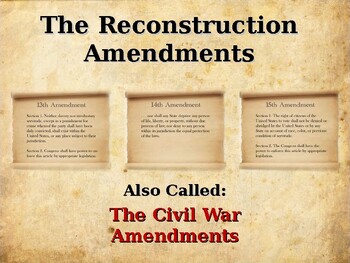My fellow classmates presented the reify victory into the concrete language of the law, anti-slavery leaders in Washington drafted the 13th, 14th and 15th Amendments (the Reconstruction Amendments), and the states ratified them, they hoped, to put a final period on the end of the sentence.


The next thing I learned about was the Civil Rights Act of 1866 and 1875. The Civil Rights Act of 1866 protected all people in the United States and their civil rights to furnish the means of their vindication. This guaranteed basic economic rights to create contracts, sue, inherit, purchase lease, or own property. Lastly, it guaranteed citizens the right to engage in business and give evidence in court.

Lastly, I learned the Civil Rights of Act of 1875. This act was designed to "protect all citizens in their civil and legal rights", providing for equal treatment in public accommodations and public transportation and prohibiting exclusion from jury service. This granted all Americans, regardless of race, equal access to all public places. This included places like theaters, hotels, train stations, and restaurants. Another thing this act provided positively set a penalty for anyone who denied equal access for someone else because of race. This resulted in a $500, which was a very good amount of money given the time period.
/cra-58b6de495f9b586046478d35.jpg)

No comments:
Post a Comment